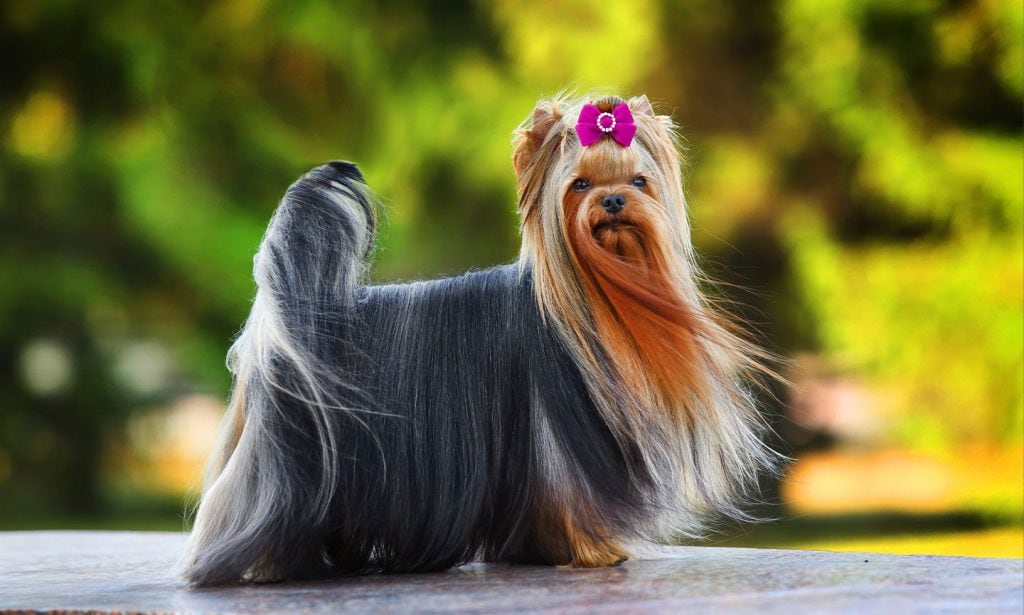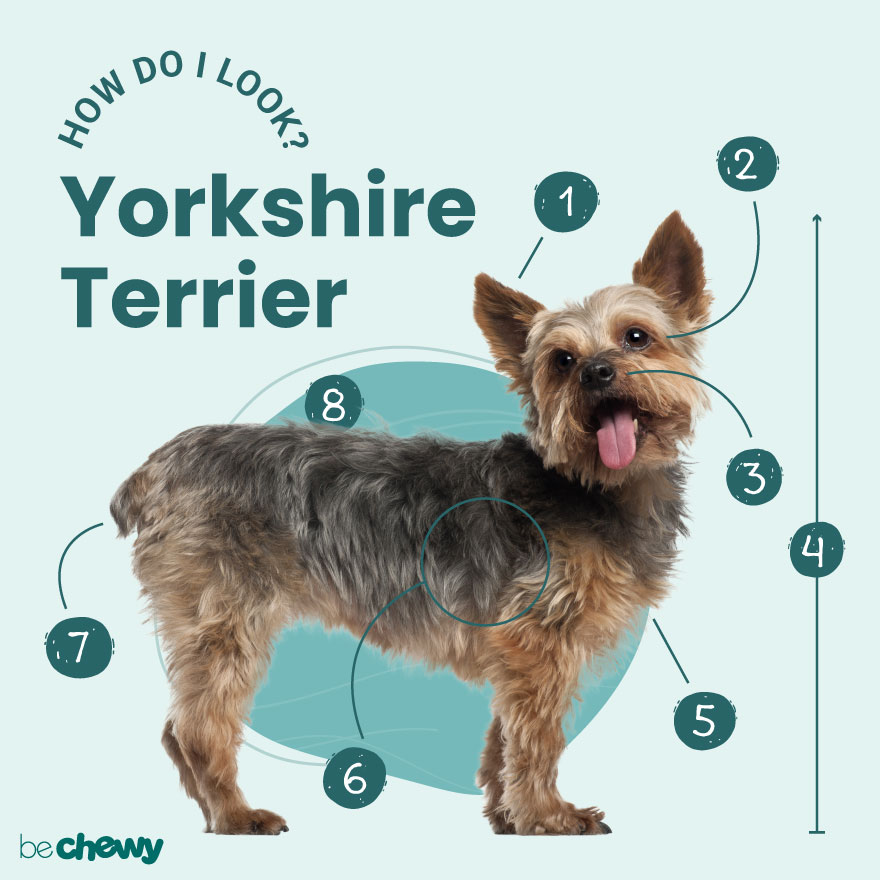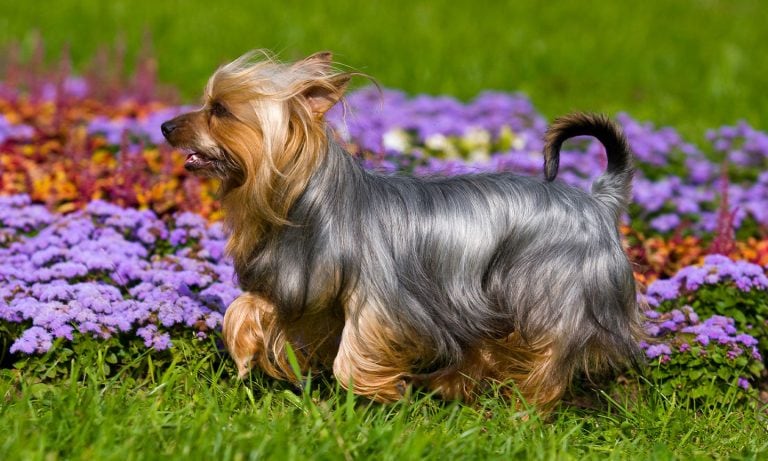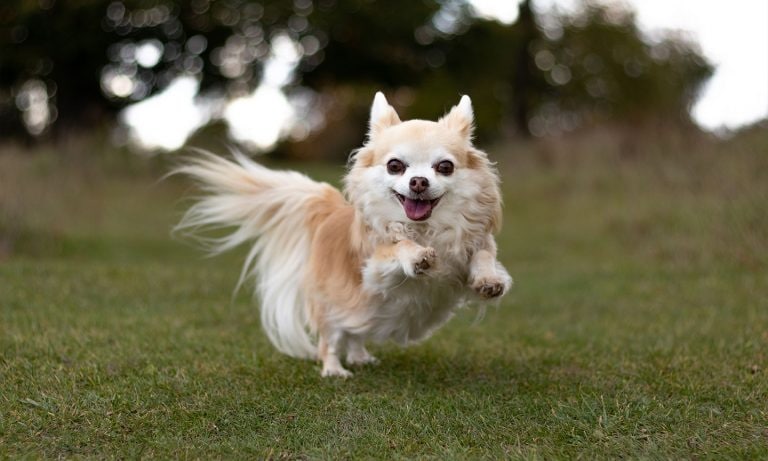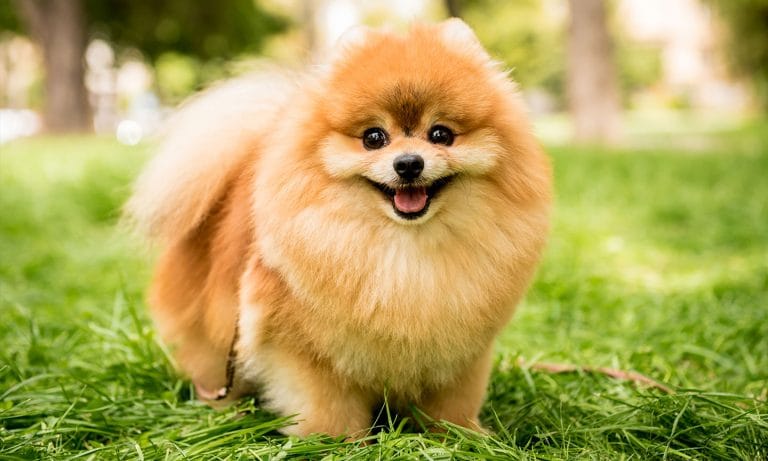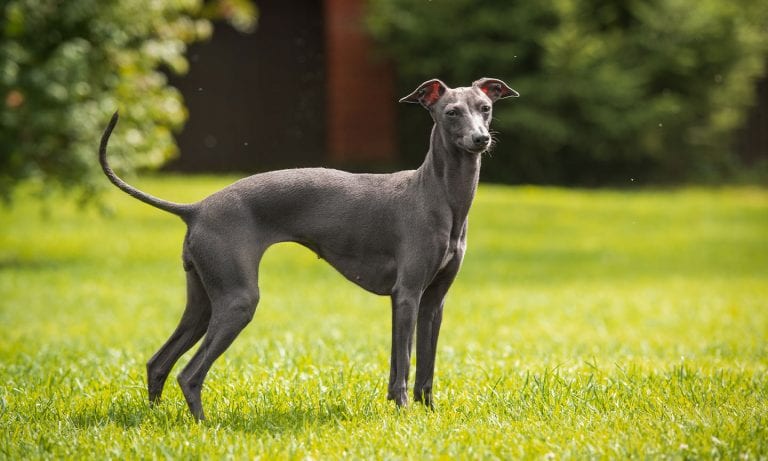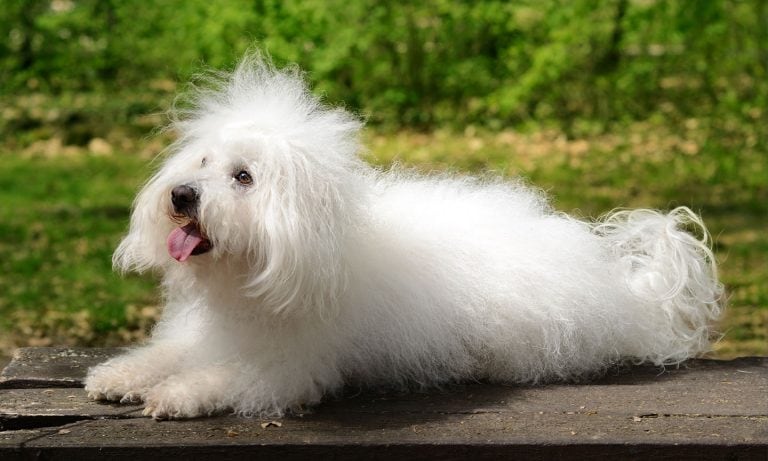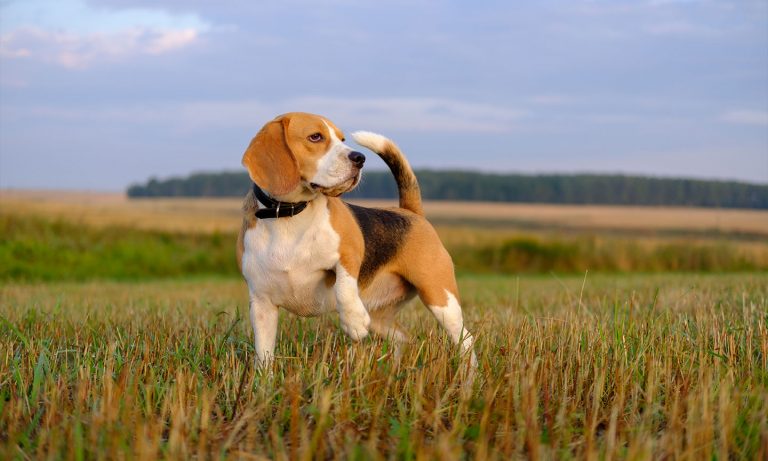Looking for a pet who looks just as glamorous as you do (aka very)? The long-tressed Yorkshire Terrier might be the dog for you. The Yorkie’s golden, human-like hair needs plenty of upkeep—we’re talking conditioners, detangling sprays, brushes and bows! But these smart cookies will pay you back in loyalty, cuddles, playfulness, attitude and, of course, almost unbearable cuteness. Live in a city? Even better. Yorkies don’t need much living space and are portable enough to tote on the subway. Though they need a lot of attention, your Yorkshire Terrier dog will happily follow you wherever you go.
Breed Snapshot
Temperament:
CleverFeistyCuddlyCoat Color:
Black And Gold; Black And Tan; Blue And Tan
Best For
Yorkshire Terriers are best for pet parents who are able to spend the most of the day with their pup. They do better in homes without small children or other dogs. And they're good for apartment-dwellers.
Yorkshire Terrier Temperament
Yorkshire Terriers are friendly and will love your family members and house guests if properly socialized as pups. However, they aren’t great with young kids and babies—or, rather, young children aren’t great with them, especially those who like to play rough and haven’t been taught how to respect a dog’s boundaries.
The Yorkshire Terrier is a super-smart, super-cute and super-friendly dog. Like many small dog breeds, Yorkies aren’t aware of their diminutive stature. Full of confidence and spunk, your pup might take over full command of the household, not-so-gently letting you know when it’s time to wake up, put the food out and go for a walk. How? Yorkies can yap. They’re really, really, really good at it.
If their big personality—and high-pitched bark—are given run of the show, though, Yorkies can get a little too full of themselves, possibly developing aggressive temperament towards visitors and new people. But as long as your Yorkshire Terrier knows who’s boss (that would be you) and is given plenty of opportunities for social interactions with humans and canines from an early age, this breed can be a loyal, playful and friendly best bud.
Yorkshire Terriers don’t mind being handled and carried, so they’re some of the most portable pups around. Just be careful not to coddle them too much. Yorkshire Terriers still need exercise and independence so that they don’t grow afraid to be out of your arms. In fact, because Yorkies don’t love being alone, many Yorkie parents get two so they can keep each other company.
Young children aside, Yorkshire Terriers are perfect playmates for almost everyone. They can even get along with other dogs and cats if they grow up in a home with them. But beware if you have a hamster, guinea pig or other small animal; this terrier was bred to catch rodents and will chase them around the house.
How to Care for a Yorkshire Terrier
Yorkshire Terriers may be small, but that doesn’t mean they need any less care than larger canines. Their hair alone requires lots of upkeep! Those silky tresses need plenty of brushing to keep from getting tangled and matted. They also need weekly checks and care of their teeth and ears. You won’t have to plan long exercise sessions, so instead, use this time to focus on grooming, cuddling and training. After all, their feisty temperament means they need to know who’s boss.
Yorkshire Terrier Health
Your Yorkshire Terrier will likely lead a perfectly healthy life with a generous lifespan of 12 to 15 years, but all dog breeds are at risk for certain health issues. Being aware of them may help you recognize any concerns—and get treatment—sooner.
- Collapsed Trachea: The Yorkie dog breed is prone to collapsed trachea, making them unable to breathe. Treat their neck carefully and use a properly fitting collar (be sure two fingers fit snuggly between the collar and your dog’s neck). When out and about, use a harness with the leash so you don’t pull on their neck. Treatments for a collapsed trachea range from pain medications to anti-inflammatories and weight loss. In severe cases, surgery may be needed.
- Hypoglycemia: Yorkie puppies before the age of 5 months are at risk for hypoglycemia, a sudden drop in blood sugar that can cause drowsiness, rapid heart rate, rapid breathing, tremors, seizures and vomiting. Call your vet ASAP if you notice any of these symptoms; your Yorkie will be treated with fluids and glucose.
- Periodontal Disease: The Yorkshire Terrier’s tiny mouth is to blame for the breed’s propensity for dental problems. Their teeth are often overcrowded, leaving plenty of nooks and crannies for plaque to develop and cause gum disease. Brush your Yorkie’s teeth often (a few times a week if you can’t manage every day) and check their gums regularly for swelling.
- Legg-Calve-Perthes Disease: A rare and likely genetic disease of the hip joint and connecting femur bone, Legg-Calve-Perthes usually develops in the first year, causing pain and limping. Serious cases may require surgery, and most Yorkies make a full recovery afterwards.
- Luxating Patella: Yorkshire Terriers have a genetic predisposition for dislocated kneecaps, aka luxating patella. The dislocation may happen suddenly after a fall, but often develops over time. Some Yorkies will stop walking when this happens and some adjust their gait—you may notice a skipping-type of walk—to lessen the pain. Mild cases may resolve with anti-inflammatory medications, physical therapy, water therapy, and/or massage, while serious ones might require surgery.
- Progressive Retinal Atrophy (PRA): The Yorkshire Terrier breed is also genetically at risk for abnormal development of the retina, the light-sensitive tissue that lines the back of the eye. When retinal issues are detected in your young Yorkshire Terrier puppy (around 2 to 3 months), it’s called retinal dysplasia. Late-onset PRA is usually diagnosed between 3 and 9 years of age. Either way, it can cause vision loss. Sadly, there is no current treatment for PRA, but with plenty of help and encouragement, Yorkies with low to no vision can thrive.
Yorkshire Terrier History
Like the name suggests, the Yorkshire Terrier is a terrier who has their origin in—you guessed it—Yorkshire, England, in the mid-1800s. These dogs are likely descendants of the Scottish Terriers, brought to the area by Scots who came looking for jobs. Like most terriers, Yorkies were bred to hunt and kill small vermin. In their case, Yorkies were probably put to work in mines ratting out, well, rats. By the late 1800s, this working-class, soot-snouted little dog captured the attention of the posh Victorian ladies of the day, who cleaned them up and made them proper lapdogs.
The pups made their way to the US, and the American Kennel Club recognized the Yorkshire Terrier breed in 1885. During World War II, Smoky, a Yorkie found by an American solider in New Guinea, accompanied US troops on their missions in the South Pacific and was credited with 12 combat missions and awarded eight battle stars.
The Yorkshire Terrier Club of America was founded in 1951. Though the Yorkie fell to No. 13 in the AKC’s 2020 list of the most popular dog breeds, they had previously been in the Top 10 since 2013.
Are you looking to get a Yorkie as a pet? You can find responsible breeders at the AKC’s website. A Yorkshire Terrier puppy can cost anywhere from $1,500 to $3,000. For this price, you’re typically getting a dog who’s been screened for health and temperamental concerns and may even come with papers. If you’d like to adopt, reach out to a Yorkshire Terrier rescue organization or keep an eye out for the breed at your local animal shelter. Pro tip: If you’re looking for a Yorkie with white in their fur, you may be looking for a Biewer Terrier, a close cousin to the Yorkshire Terrier.
Some unscrupulous breeders may advertise “teacup” or “tiny toy” or “extreme tiny” Yorkies, which are dangerously bred to weigh less than three or four pounds. Yorkies are already a Toy breed, and these other names are simply a marketing ploy.
FAQs
Are Yorkies hypoallergenic?
Yes, the Yorkie is considered hypoallergenic. While no dog is 100-percent hypoallergenic, the Yorkshire Terrier is a low-shedding pup and is a great choice for potential pet parents with allergies.
Do Yorkshire Terriers bark a lot?
Yorkshire Terriers rate high on the barking scale so you might need to consider some training to curb this trait before it becomes a nuisance.
How big do Yorkshire Terriers get?
Yorkshire Terriers are extra-small, coming in at seven to eight inches at the shoulder and weighing about seven pounds.
What are the most common Yorkie mixes?
- Yorkie-Chihuahua mix (Chorkie)
- Yorkie-Jack Russell mix
- Yorkie-Poodle mix (Yorkipoo)
- Yorkie-Schnauzer mix
- Yorkie-Dachshund mix
- Yorkie-Shih Tzu mix (Shorkie)
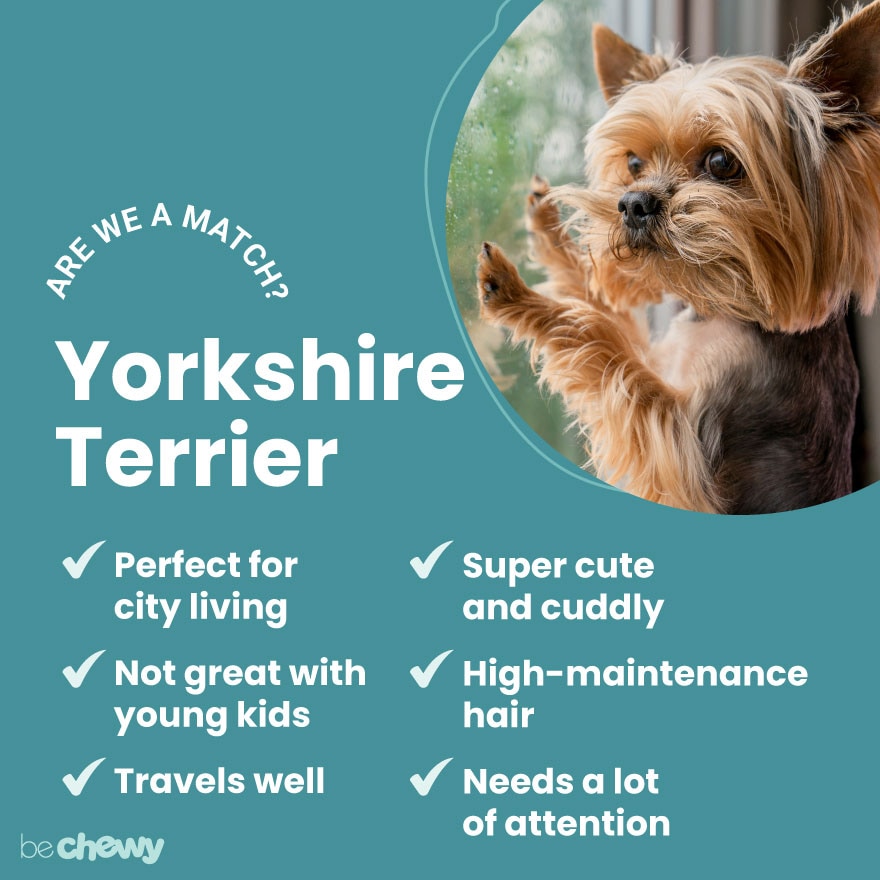
Top Takeaways
Yes, Yorkshire Terriers are traditionally “lap” dogs and yes, they do have fancy-shmancy hair. But these teddy-bear pups are much more than that: Yorkies are energetic, brave, playful and demanding your attention. Treat them like a doll at your own risk. While they’re easy to pick up, Yorkies can learn to be nervous and aggressive if they’re always carried and protected. But with a healthy mix of mild exercise and independence, Yorkies will calmly and confidently stay by your side for life—and will likely always have better hair than you.
Expert input provided by Jennifer Coates, DVM, a veterinarian in Fort Collins, Colo., and Elizabeth H. “Kizz” Robinson, CDBC, CPDT-KA of 2B Dog Training in Brooklyn, N.Y.

Search for Adoptable Yorkshire Terriers Near You
Top Yorkshire Terrier Names
These are the top Yorkshire Terrier names as chosen by Chewy's pet parents!
Female Names
- Bella
- Luna
- Coco
- Daisy
- Chloe
- Mia
- Lola
- Lucy
- Zoey
- Sophie
Male Names
- Milo
- Teddy
- Max
- Bentley
- Charlie
- Cooper
- Toby
- Oliver
- Gizmo
- Rocky
Share:
